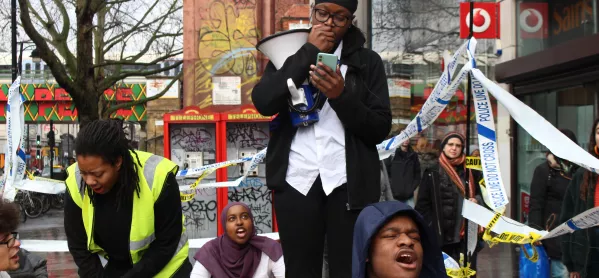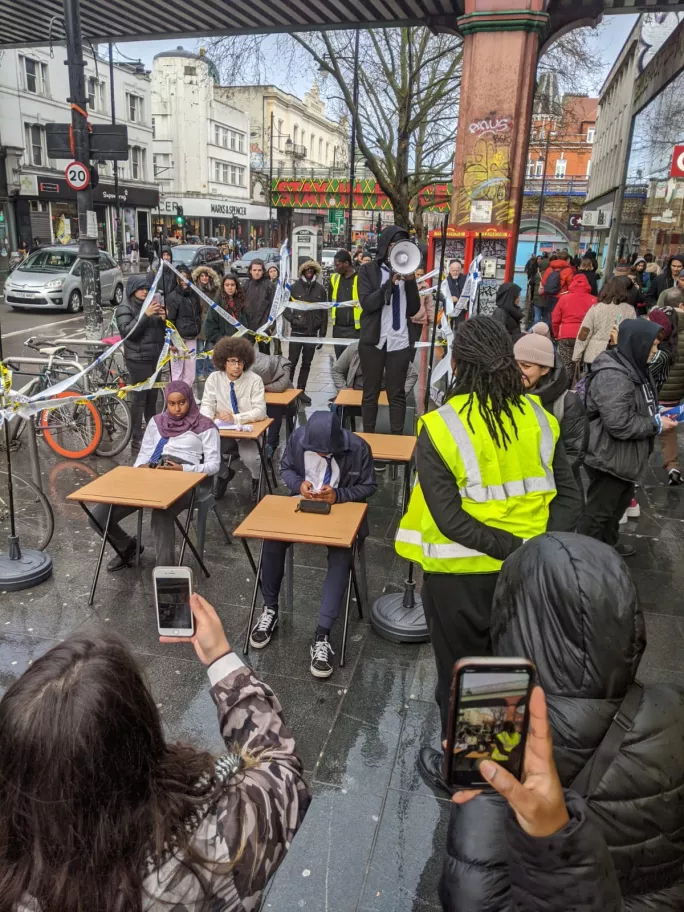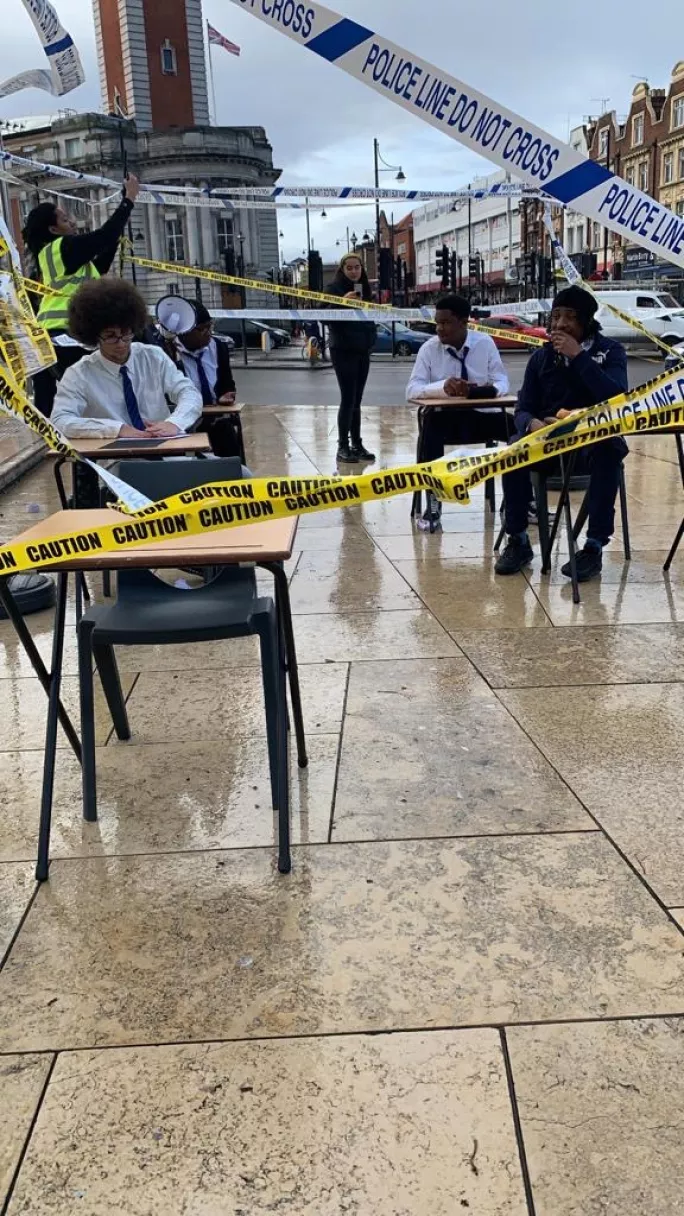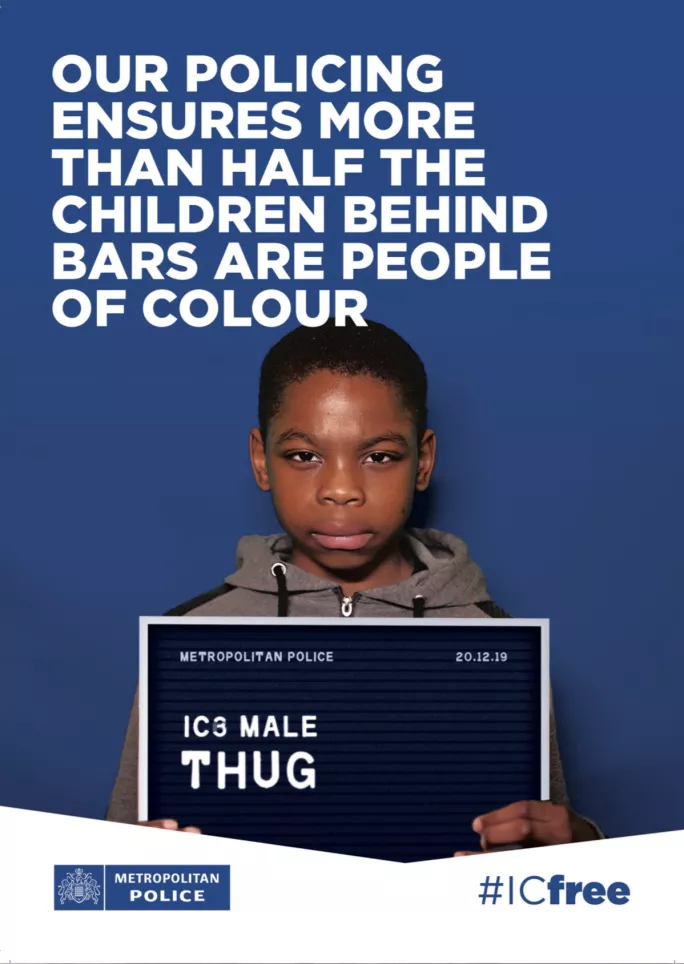- Home
- Pupils fighting for a national anti-exclusion campaign
Pupils fighting for a national anti-exclusion campaign

Pupils who used a mock classroom to protest against isolation booths want to spark a “national movement” against school exclusions.
The campaigners, known as IC Free - a reference to the identity code used by British police to refer to the ethnicity of black suspects - are a group of South London pupils with concerns about the education and the criminal justice systems.
They say they want to end “the criminalisation of black and brown young people in our schools and on our streets”.
Opinion: ‘Isolation booths are bonkers’
Quick-read: Isolation rooms: should they be banned?
Related: Managed moves ‘mask true scale of exclusions’

“It’s dangerous to grow up in the UK as a black and brown teenager: we are more likely to be stopped and searched by the police, to suffer from mental health issues and to experience school exclusion, unemployment and incarceration,” their manifesto reads.
Fears over pupil isolation
“We need to break this cycle of injustice and mistreatment by challenging the underlying perceptions of black and brown students within the education system and on the streets.”
Last month, the group set up a mock classroom in Brixton, South London, to represent time spent in an isolation booth, with desks cordoned off by police tape.
Outside Brixton tube rn! A crime scene installed around kids at school desks in protest of racism in schooling and policing. A campaign led by black and brown college students, it’s so important to listen- they deserve BETTER than police harassment & school exclusion #ICFree pic.twitter.com/Rh6x8N7abD
— pisces against prisons (@KelseyMxMo) December 21, 2019
All of the group have experienced temporary or permanent exclusion themselves, and they are seeking to end internal exclusions, as well as calling for local authority-wide targets to limit the number of permanent exclusions.
“We would absolutely love for the campaign to become a national movement of students against exclusions - that will draw attention to those who hold power and force them to make a change,” said Olamide Taiwo, one of the pupils involved.
"In school, black and brown youth are being treated like criminals, and it stops our growth." #ICFree @ICFreeUK pic.twitter.com/SgM5xNihu4
— The Advocacy Academy (@AdvocacyAcademy) December 24, 2019
They are also campaigning for pupil-referral units to be abolished in their current form or given significant additional funding.
BRIXTON STATION !!!! #ICFREE #ICFreeNotIC3 pic.twitter.com/420zf0cdIK
— ICFree #ICFree (@ICFreeUK) December 21, 2019

Ms Taiwo added: “When we share our content and our actions on social media, we aim to inspire pupils and adults around the country, mostly people in our community, so that they are more aware of what is going on around us and aim to take actions with us.”
She said she hoped the campaign would lead schools to “find alternative ways of dealing with children that are more productive for the child in terms of their education and mental state”.
Sima Mangal, another pupil involved in the campaign, said: “IC Free is a campaign about the criminal justice system and the education system, and how it affects people of colour.
“I’ve had experiences in both areas, in both institutions. In schools, I’ve experienced exclusions three times. I’ve been sent to isolations where we weren’t really given work, we were just told to sit there for six or seven hours doing nothing.”
Protest against school exclusions
Describing the mock classroom stunt and the motives behind it, pupil Chanay Golding said the group wanted “to portray how it is in an isolation unit - showing that children are not really learning, they are just sitting down there, being told off”.
“You still have anger building up inside you and [teachers] will not listen to you about it,” she said. “That just shows that the whole idea behind isolation making children behave themselves and not get in trouble again does not really work - it is more of a theory than reality.”
Ms Golding said this was symptomatic of the “school to prison pipeline” that disproportionately targets black and minority ethnic pupils.
“Personally, being in an isolation booth, I thought, ‘Oh, here we go again,’ and I would get upset and angry, because no one was listening to me or hearing what I was trying to say,” she added.
“I’d just been cast aside, like, ‘Oh, do it yourself,’ like, ‘There’s no point wasting time on you, go sit in the corner.’ You are given up on.”
However, she acknowledged that there was a lack of funding, that teachers had to cope with classes of 30, and that schools needed resources for better alternatives than isolation rooms for pupils in distress.
Tom Bennett, the Department for Education’s behaviour tsar, said internal exclusions kept staff and student safe, while the term “isolation” in relation to pupils being removed from lessons was misleading.
“Schools typically remove students from lessons because they are threatening other children, insulting other students or staff, or making learning impossible,” he said.
“Teachers rarely use it for trivial reasons, but to make sure children are taught in a calm, safe environment. It is impossible and immoral to expect teachers to teach and students to learn in anything less than this context.
“People who object to this process are rarely those responsible for running challenging classrooms. We wouldn’t expect staff in any other context to put up with abusive behaviour, so why should teachers be made to suffer differently?”
Alex McArthur-James, another pupil involved in the group, who has faced exclusion several times, said he felt internal exclusions did not provide pupils with meaningful academic work and left them further behind.
“I’ve just missed a whole week’s worth of school and they don’t send you enough work to catch up with, or if they do you’re not going through it with the teacher, so if you don’t understand, you just don’t understand. I think it’s more detrimental to students’ learning,” he said.
“It’s not that you’re just not given enough to do, it’s that the people in charge of running isolations, they just don’t care enough about whether you’re doing your work or not, or to help you with your work. They just sit there, in my personal experience.”
Mr Bennett said: “Work should be provided at all times - an education must be the aim. In my experience, most of the students who sit and do little in such a context have chosen to do so, despite work provided.
“And, of course, students who experience reprimand in schools frequently feel they have been hard done by, principally because people rarely feel that they are in the wrong.
“But as adults responsible for their education and safety, we have to make these decisions on their behalf, and try to teach them how to improve their behaviour, not just by sanction but by instruction, patience, coaching and discussion.”
Mr McArthur-James said that most of the time internal isolation rooms were not run by qualified teachers.
While he has had to restart Year 13 after being excluded, he explained, “I’m one of the luckier ones - when you get permanently excluded, it’s really hard. A lot of my friends will either end up going to a PRU or something like that.
“It’s like a gateway, because I don’t know any single person who’s gone to a PRU and has gone and got GCSEs or any type of qualification. After you’ve been excluded, other schools will not want to take you in - you only have one real path at that point, just out, with a lot of free time on the street.
“The campaign touched quite close to home because I’ve had a lot of dealings with police interactions and exclusions.”
Mr McArthur-James said he suspected that some schools excluded pupils in Year 13 because they failed to meet their target grades, using attendance data as an excuse.
The group is part of a wider network of student activists in South London called the Advocacy Academy, and are planning further action against exclusions at their graduation ceremony from the scheme tomorrow.
Ms Golding said: “The education system is too structured. It’s not just about curriculum, it’s the middle gap between us growing up and the real world.
“There is no emotional relationship between teachers and students - I understand it needs to be professional for safeguarding - but teachers should still be allowed to be human, and should be human towards kids. What we see them doing is what we will take on board, and behave the same way or even worse.”
The group has also produced a series of posters drawing attention to how police target black and minority ethnic young people disproportionately.

Keep reading for just £1 per month
You've reached your limit of free articles this month. Subscribe for £1 per month for three months and get:
- Unlimited access to all Tes magazine content
- Exclusive subscriber-only stories
- Award-winning email newsletters



